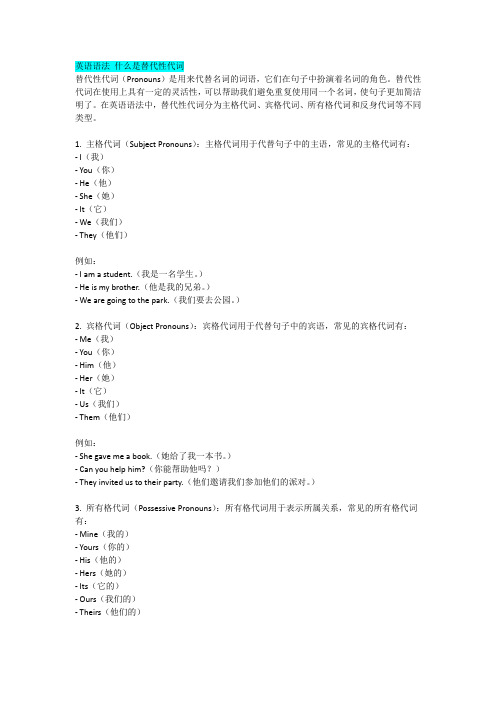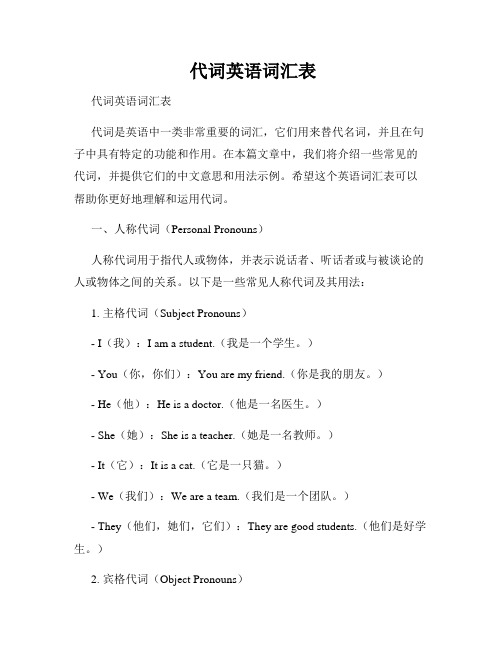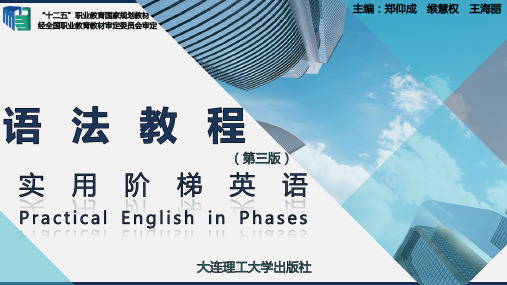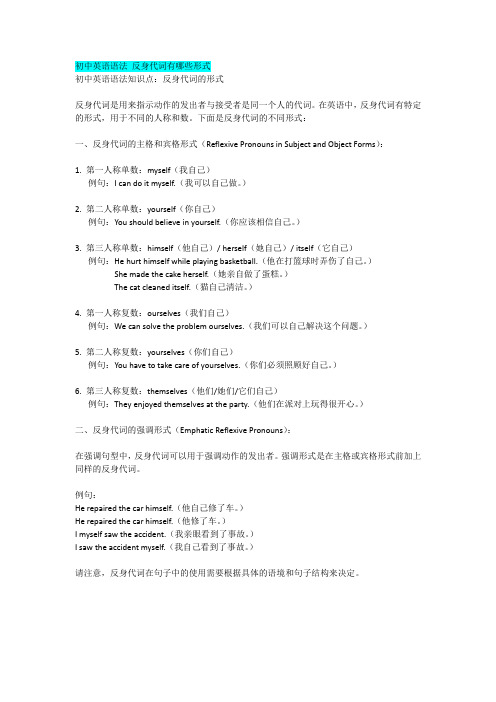英语语法之反身代词reflexive pronouns
Reflexive Pronoun 反身代词用法

▪Reflexive Pronoun 反身代词用法:▪1)做宾语a. 有些动词需有反身代词absent,bathe,amuse,blame,dry,cut,enjoy,hurt,introduce,behavewe enjoyed ourselves very much last night.我们昨晚玩得很开心。
please help yourself to some fish.请你随便吃点鱼。
b. 用于及物动词+宾语+介词take pride in,be annoyed with,help oneself to sth.i could not dress (myself)up at that time.那个时候我不能打扮我自己。
注:有些动词后不跟反身代词,get up,sit-down,stand up,wake up等。
please sit down.请坐。
▪2)作表语;同位语be oneself:i am not myself today.我今天不舒服。
the thing itself is not important.事情本身并不重要。
▪3)在不强调的情况下,but,except,for 等介词后宾语用反身代词或人称代词宾格均可。
如:no one but myself (me)is hurt.▪注意:a. 反身代词本身不能单独作主语。
(错)myself drove the car.(对)i myself drove the car.我自己开车。
b. 但在and,or,nor连接的并列主语中,第二个主语可用反身代词,特别是myself作主语。
Charles and myself saw it.▪4)第二人称作宾语,要用反身代词。
you should be proud of yourself.你应为自己感到骄傲。
▪ 1. 基本用法特点need可用实意动词和情态动词,用作情态动词时,意思是“有必要”或“需要”,其后接动词原形,通常只用于否定句或疑问句以及if或whether之后,一般不用于肯定句。
反身代词的用法及讲解

反身代词的用法及讲解反身代词(Reflexive Pronoun)是代替主语并且在句子中作为它的宾语的代词。
反身代词指的是由人称代词(Personal Pronoun)加上后缀“self”或“selves”而构成的一类代词。
在英语语法中,反身代词扮演着重要的角色,是准确表达英语语言语法结构的关键之一。
本文将为大家详细介绍反身代词的用法及讲解。
一、反身代词的构成反身代词是由人称代词(第一人称、第二人称和第三人称代词)加上后缀“-self”或“-selves”而构成的。
如下表所示:|人称 | 单数 | 复数 ||:-----:|:----:|:----:||第一人称| myself | ourselves ||第二人称| yourself | yourselves ||第三人称| himself/herself/itself | themselves |反身代词可以分为强调反身代词(Emphatic Reflexive Pronouns)和非强调反身代词(Non-emphatic Reflexive Pronouns)。
强调反身代词的作用是强调一个动作由主语自己完成,或者强调主语的身份特征。
强调反身代词通常出现在句子的其形式为:人称代词/指示代词/名词+反身代词。
例如:- I myself made this cake.(我亲自制作了这个蛋糕。
)- You yourself are responsible for the consequences.(你自己要对后果负责。
)- He himself is a talented musician.(他本人是位才华横溢的音乐家。
)1. 表达自我主观意识的行为当主语自己完成某个动作或者由于自己的努力才取得了某种成果时,通常使用反身代词。
- The boy hurt himself while playing football.(这个男孩在踢足球时自己受伤了。
高中英语知识点归纳语法代词的使用与指代关系的处理

高中英语知识点归纳语法代词的使用与指代关系的处理高中英语知识点归纳:语法代词的使用与指代关系的处理代词作为英语语法中重要的一部分,广泛应用于各种语境中。
在使用代词的同时,恰当处理代词的指代关系也是非常重要的。
本文将就高中英语中代词的使用与指代关系的处理进行归纳和总结。
一、代词的分类代词是替代名词使用的词语,根据其所表达的意义和用法的不同,可以分为人称代词、物主代词、指示代词、疑问代词、不定代词、反身代词等几种。
1. 人称代词(Personal Pronouns)人称代词用来代替特定的人或事物,主要分为主格和宾格两种形式。
主格包括I、you、he、she、it、we、they;宾格包括me、you、him、her、it、us、them。
例如:- Tom is my friend. He is very kind.- Can you lend me your pen?2. 物主代词(Possessive Pronouns)物主代词用来表示某物归属于某人,也分为形容词性和代词性两种形式。
形容词性物主代词修饰名词,代词性物主代词可直接替代名词。
例如:- This is my book. (形容词性)- This book is mine. (代词性)3. 指示代词(Demonstrative Pronouns)指示代词用来指代离说话人或距离较近的事物。
包括this、that、these、those等形式。
例如:- This is my car. That is his car.4. 疑问代词(Interrogative Pronouns)疑问代词用来提问特定的人或事物,在句子中作主语、宾语或定语。
例如:- Who is your English teacher?- Which book do you prefer?5. 不定代词(Indefinite Pronouns)不定代词用来泛指不确定的人或事物,常见的不定代词包括somebody、anybody、something、anything等。
反身代词用法

用法注意事项释义反身代词fǎnshēn dàicí[reflexive pronoun]如:A marked bee fed itself from the dish and returned to the hive.1)翻译:一只做了标记的蜜蜂从盘中喂饱自己以后就飞回蜂箱了。
(itself 与 bee 在人称、性质、数上保持一致)2)In 1955 Walt Disney himself opened the first Disney park.翻译:1955年,沃尔特.迪斯尼亲自创办了第一个迪斯尼公园。
(himself 与 Walt Disney 在人称、性质、数上保持一致)构成1、第一、二人称的反身代词是由形容词性物主代词加上-self或-selves构成的。
如:I--myself we--ourselves you(单数)-- yourself you(复数)-- yourselves2、第三人称的反身代词是由人称代词的宾格加上-self或-selves构成的。
如:she--herself he --himself it--itself they--themselvesone--oneself编辑本段用法口诀反身代词表自身,句中可作三成分动介后面用作宾,表示动作回自身句中强调同位语,主语宾语后变跟系动be后作表语,这个用法要牢记1、作宾语,此时的宾语指a. 有些形容词需有反身代词absent, bath, amuse, blame, dry, cut, enjoy, hurt, introduce, behaveyourself to some fish. 翻译:请你随便吃点鱼。
We enjoyed ourselves very much last night. 翻译:我们昨晚玩得很开心。
b. 用于及物动词+宾语+介词take pride in, be annoyed with, help oneself to sth.I could not dress (myself) up at that time. 翻译:那个时候我不能打扮我自己。
英语语法 什么是替代性代词

英语语法什么是替代性代词替代性代词(Pronouns)是用来代替名词的词语,它们在句子中扮演着名词的角色。
替代性代词在使用上具有一定的灵活性,可以帮助我们避免重复使用同一个名词,使句子更加简洁明了。
在英语语法中,替代性代词分为主格代词、宾格代词、所有格代词和反身代词等不同类型。
1. 主格代词(Subject Pronouns):主格代词用于代替句子中的主语,常见的主格代词有:- I(我)- You(你)- He(他)- She(她)- It(它)- We(我们)- They(他们)例如:- I am a student.(我是一名学生。
)- He is my brother.(他是我的兄弟。
)- We are going to the park.(我们要去公园。
)2. 宾格代词(Object Pronouns):宾格代词用于代替句子中的宾语,常见的宾格代词有:- Me(我)- You(你)- Him(他)- Her(她)- It(它)- Us(我们)- Them(他们)例如:- She gave me a book.(她给了我一本书。
)- Can you help him?(你能帮助他吗?)- They invited us to their party.(他们邀请我们参加他们的派对。
)3. 所有格代词(Possessive Pronouns):所有格代词用于表示所属关系,常见的所有格代词有:- Mine(我的)- Yours(你的)- His(他的)- Hers(她的)- Its(它的)- Ours(我们的)- Theirs(他们的)例如:- This pen is mine.(这支笔是我的。
)- Is this book yours?(这本书是你的吗?)- The cat licked its paws.(猫舔了它的爪子。
)4. 反身代词(Reflexive Pronouns):反身代词用于强调动作的执行者与承受者是同一人(或同一事物),常见的反身代词有:- Myself(我自己)- Yourself(你自己)- Himself(他自己)- Herself(她自己)- Itself(它自己)- Ourselves(我们自己)- Themselves(他们自己)例如:- I hurt myself while playing basketball.(我在打篮球时弄伤了自己。
英语语法 什么是反身性物主代词

英语语法什么是反身性物主代词反身性物主代词(Reflexive Possessive Pronouns)是一种特殊的代词形式,既具有反身性质,又具有所有格(物主)的含义。
它们用于表示动作的主体同时是动作的宾语,并指示该动作与主体之间的所有关系。
常见的反身性物主代词包括:myself, yourself, himself, herself, itself, ourselves, yourselves, themselves。
反身性物主代词在句子中有多种作用和用法,下面将详细介绍它们的用法和相关例句。
1. 反身代词用于表示自己的所有权或所属关系。
- I have prepared the presentation myself.(我自己准备了这个演示。
)- She bought herself a new car.(她给自己买了一辆新车。
)2. 反身代词用于强调或加强句子中的主语。
- I myself am responsible for the mistake.(我自己对这个错误负责。
)- They themselves organized the event.(他们自己组织了这个活动。
)3. 反身代词用于表示与主语相关的动作或状态。
- He hurt himself while playing football.(他踢足球时受伤了。
)- We enjoyed ourselves at the party.(我们在聚会上玩得很开心。
)4. 反身代词用于表示互相之间的关系。
- They congratulated themselves on their success.(他们为自己的成功互相祝贺。
)- The children helped each other with their homework.(孩子们互相帮助做作业。
)5. 反身代词用于表示特定的人或物归属于自己。
- The book is mine. I bought it myself.(这本书是我的。
英语语法之反身代词

presence are the same person or thing, and they match the
gender or nature of that person or thing
Ourselves
Definition
"Ourselves" is a reflective professor that refers back to the group that includes the speaker and at least one other person
01
Overview of reflective pronouns
Definition and characteristics
01
02
Definition: Reflexive proofs are proofs that end in "- self" or "helps" and are used when the subject and object of a verb are the same
Yourselves
Definition
"Yourselves" is a reflexive pronoun that refers back to the group being addressed
Example
"You should all take care of yourself."
Usage notes
Yourself
Definition
"Yourself" is a reflexive pronoun that refers back to the person being addressed It is used when the subject and the object of the presence are the same person
代词英语词汇表

代词英语词汇表代词英语词汇表代词是英语中一类非常重要的词汇,它们用来替代名词,并且在句子中具有特定的功能和作用。
在本篇文章中,我们将介绍一些常见的代词,并提供它们的中文意思和用法示例。
希望这个英语词汇表可以帮助你更好地理解和运用代词。
一、人称代词(Personal Pronouns)人称代词用于指代人或物体,并表示说话者、听话者或与被谈论的人或物体之间的关系。
以下是一些常见人称代词及其用法:1. 主格代词(Subject Pronouns)- I(我):I am a student.(我是一个学生。
)- You(你,你们):You are my friend.(你是我的朋友。
)- He(他):He is a doctor.(他是一名医生。
)- She(她):She is a teacher.(她是一名教师。
)- It(它):It is a cat.(它是一只猫。
)- We(我们):We are a team.(我们是一个团队。
)- They(他们,她们,它们):They are good students.(他们是好学生。
)2. 宾格代词(Object Pronouns)- Me(我):He greeted me.(他向我打招呼。
)- You(你,你们):I saw you yesterday.(我昨天见到了你。
)- Him(他):I helped him with his homework.(我帮他做作业。
)- Her(她):I gave the book to her.(我把书给了她。
)- It(它):The cat followed me, it was adorable.(那只猫跟着我,它很可爱。
)- Us(我们):They invited us to their party.(他们邀请我们参加他们的派对。
)- Them(他们,她们,它们):I called them yesterday.(我昨天给他们打电话了。
实用阶梯英语语法- Chapter 5 Pronouns

第三人称
his
her
its
his
her
its
第一 人称 our
ours
复数
第二 人称
your
第三人 称
their
yours theirs
Exercises to
5.2
5.3
Reflexive Pronouns(反身代词)
英语中表示“我自己”、“他自己”等意义的代词称为反 身代词。
反身 代词
Exercises to
5.6
5.7
Indefinite Pronouns (不定代词)
英语中常用的不定代词有:some, any, no, none, many, much, few, little , each, every, one, all, both, either, neither, other, another 等。
5.5
this/these/that/those (指示代词)
英语中的指示代词主要有:this(这个)、that(那个)、these (这些)和 those(那些)等。
Exercises to
5.5
5.6
each other/ one another (相互代词)
英语中的相互代词有 each other 和 one another,它们都 可以表示两个以上的人或事物之间的相互关系,三者及以上常 用 one another.
第一 人称
myself
单数
第二 人称
第三人称
第一 人称
复数
himself, herself,
itself
ourselves yourselves themselves
英语语法 反身代词有哪些常见的例子

英语语法反身代词有哪些常见的例子在英语语法中,反身代词(Reflexive Pronouns)是指用来指代动词的主语并强调主语自身的代词。
它们与动词的主语在人称和数上保持一致,并在句子中起到反身作用。
以下是一些常见的反身代词及其用法:1. Myself(我自己)-指代第一人称单数主语- I can do it myself.(我自己可以做这件事。
)- I hurt myself while playing football.(我在踢足球时自己受伤了。
)2. Yourself(你自己)-指代第二人称单数或复数主语- Take care of yourself.(照顾好你自己。
)- Did you enjoy yourself at the party?(你在派对上玩得开心吗?)3. Himself(他自己)-指代第三人称男性单数主语- He fixed the car himself.(他自己修好了汽车。
)- John is very proud of himself.(约翰为自己感到骄傲。
)4. Herself(她自己)-指代第三人称女性单数主语- She cooked dinner herself.(她自己做了晚餐。
)- Mary bought herself a new dress.(玛丽给自己买了一条新裙子。
)5. Itself(它自己)-指代第三人称中性单数主语- The cat is cleaning itself.(猫正在清洁自己。
)- The flower opens itself in the morning.(这朵花在早上自己开放。
)6. Ourselves(我们自己)-指代第一人称复数主语- We can handle this situation ourselves.(我们自己可以处理这个情况。
)- Let's do the project ourselves instead of hiring someone.(我们自己做这个项目,而不是雇人。
八年级英语(上)语法(反身代词)

八年级英语(上)语法(反身代词)XXX (Grammar: Reflexive Pronouns)Reflexive Pronouns Overview:1.n: Pronouns that indicate "oneself。
itself" are called XXX.2.Like personal pronouns and possessive pronouns。
reflexive pronouns also have forms that vary in person and number。
The specific forms and meanings in Chinese are shown in the table below:PersonTypeFirst PersonSingular/PluralXXXSingular/PluralThird PersonSingular/SingularHerselfSingularItselfPluralXXXReflexive PronounsXXXXXXXXX/XXXXXX/ItselfNote: The reflexive pronouns of the first and second persons are formed by adding "-self" (singular) or "-selves" (plural) to the corresponding possessive pronouns。
The reflexive pronouns of the third person are formed by adding "-self" (singular) or "-selves" (plural) to the corresponding objective pronouns.)Usage of Reflexive Pronouns:In English sentences。
Unit3 语法-反身代词 讲义 学年牛津译林版八年级上册

八年级第一学期英语. Unit3 A day outGrammar & Usage一、反身代词(Reflexive pronouns)的概念反身代词是以”・sel「或”-selves”结尾的代词,用来指代动作执行者本身,在句中起强调或反射作用,表示我自己(myself)>你自己(yourself)>他/她/它自己(himself/herself/itself)>我们自己(ourselves) >他们自己(themselves)等。
二、反身代词的构成第一人称、第二人称的反身代词由“形容词性物主代词+self/selves”构成。
如:myself(我自己)、ourselves(我们自己)、yourself(你自己)、youerselves(你们自己)第三人称的反身代词由“人称代词宾格+self/selves”构成。
如:himself'/herself/itself 他/她/它自己、themselves(他们自己)三、反身代词的语法功能1、用作宾语(1)反身代词可以做动词的直接宾语,直接宾语是跟随及物动词并接受动词动作的词、短语和从句。
反身代词可以出现在大多数及物动词后。
如:amuse, blame, cut, dry, enjoy, help, hurt, kill, prepare, satisfy, teach o下面来看一下例句:I hurt myself taking down Christmas decorations.我弄伤了自己把圣诞装饰品拿下来时。
She taught herself to play the piano.她自学弹钢琴。
Did you cut yourself with the paring knife?你用削皮刀割伤自己了吗?My son amused himself with the Sesame Street toys.我儿了玩芝麻街玩具自娱自乐。
初中英语语法 反身代词有哪些形式

初中英语语法反身代词有哪些形式初中英语语法知识点:反身代词的形式反身代词是用来指示动作的发出者与接受者是同一个人的代词。
在英语中,反身代词有特定的形式,用于不同的人称和数。
下面是反身代词的不同形式:一、反身代词的主格和宾格形式(Reflexive Pronouns in Subject and Object Forms):1. 第一人称单数:myself(我自己)例句:I can do it myself.(我可以自己做。
)2. 第二人称单数:yourself(你自己)例句:You should believe in yourself.(你应该相信自己。
)3. 第三人称单数:himself(他自己)/ herself(她自己)/ itself(它自己)例句:He hurt himself while playing basketball.(他在打篮球时弄伤了自己。
)She made the cake herself.(她亲自做了蛋糕。
)The cat cleaned itself.(猫自己清洁。
)4. 第一人称复数:ourselves(我们自己)例句:We can solve the problem ourselves.(我们可以自己解决这个问题。
)5. 第二人称复数:yourselves(你们自己)例句:You have to take care of yourselves.(你们必须照顾好自己。
)6. 第三人称复数:themselves(他们/她们/它们自己)例句:They enjoyed themselves at the party.(他们在派对上玩得很开心。
)二、反身代词的强调形式(Emphatic Reflexive Pronouns):在强调句型中,反身代词可以用于强调动作的发出者。
强调形式是在主格或宾格形式前加上同样的反身代词。
例句:He repaired the car himself.(他自己修了车。
Reflexive Pronoun 反身代词用法

▪Reflexive Pronoun 反身代词用法:▪1)做宾语a. 有些动词需有反身代词absent,bathe,amuse,blame,dry,cut,enjoy,hurt,introduce,behavewe enjoyed ourselves very much last night.我们昨晚玩得很开心。
please help yourself to some fish.请你随便吃点鱼。
b. 用于及物动词+宾语+介词take pride in,be annoyed with,help oneself to sth.i could not dress (myself)up at that time.那个时候我不能打扮我自己。
注:有些动词后不跟反身代词,get up,sit-down,stand up,wake up等。
please sit down.请坐。
▪2)作表语;同位语be oneself:i am not myself today.我今天不舒服。
the thing itself is not important.事情本身并不重要。
▪3)在不强调的情况下,but,except,for 等介词后宾语用反身代词或人称代词宾格均可。
如:no one but myself (me)is hurt.▪注意:a. 反身代词本身不能单独作主语。
(错)myself drove the car.(对)i myself drove the car.我自己开车。
b. 但在and,or,nor连接的并列主语中,第二个主语可用反身代词,特别是myself作主语。
Charles and myself saw it.▪4)第二人称作宾语,要用反身代词。
you should be proud of yourself.你应为自己感到骄傲。
▪ 1. 基本用法特点need可用实意动词和情态动词,用作情态动词时,意思是“有必要”或“需要”,其后接动词原形,通常只用于否定句或疑问句以及if或whether之后,一般不用于肯定句。
【高中英语】代词-反身代词

语法-词性成分句型-词性-代词-反身代词1.定义反身代词(英文Reflexive Pronoun),是词类的一种,属于实词。
当主语和宾语/表语是同一人称时,宾语/表语需要使用反身代词表示“人称自己”;或者反身代词做名词的同位语对名词起到强调作用。
例如he himself—他自己。
2.方法论/结论2.1反身代词集合我-I-myself我们-we-ourselves你/你们-you-yourselves他-he-himself她-she-herself它-it-itself他们-they-themselves2.2反身代词做宾语/表语当句子的主语和句子的宾语/表语为同一人称时,宾语/表语不使用相应的宾格形式,而应该使用反身代词He only likes himself.–他只喜欢自己主语和宾语都是”他“,因此宾语不用him,而用"himself"I am really proud of myself.–我对自己真的很骄傲主语和宾语都是”我“,因此宾语不用"me",而用"myself"Tom hurt himself by accident.–Tom在事故中受伤了主语和宾语虽然看起来不是一个人称,但是,Tom我们分析一下,相当于he (男名,第三人称)。
因此,宾语不用”him“,而用"himself"Help yourself to anything that you want.-随便吃,想吃什么就吃什么此句子看起来没有主语,但是,这是一个祈使句,主语默认为you。
因此,我们应该使用反身代词yourselfShe is not herself today.–她今天不在状态主语和表语时同一个人,herself做表语,不使用her,而用反身代词herself2.3反身代词表示强调作用有的时候,我们为了表示强调作用,会加上相应的反身代词,表示对于主语的强调,意思为”…自己“1)常使用by+反身代词的结构(by可以省略)I wrote it by myself.我自己写的。
反身代词的用法归纳英国人 (2)

反身代词的用法归纳英国人一、什么是反身代词反身代词(Reflexive Pronouns)是一种特殊的代词,用于表示动作的主体与动作的宾语指向同一人或同一事物。
在英语中,反身代词通常以"-self"或"-selves"结尾,根据句子中的主语单复数形式进行变化。
对于英国人来说,反身代词在日常交流和书面表达中起着重要的作用。
二、反身代词的主要用法1. 表示自己完成动作:反身代词可以用来强调谁做了某件事情。
例如:- I saw myself in the mirror this morning.(今天早上我看到了自己的镜像)- He hurt himself while playing football.(他在踢足球时伤到了自己)2. 指代同一人或事物:当主语和宾语指向同一个人或事物时,可以使用反身代词来明确表达。
例如:- She cut herself with a knife accidentally.(她不小心用刀割伤了自己)- We should always believe in ourselves.(我们应该始终相信自己)3. 加强陈述句:当需要加强陈述句中的强调时,可以使用反身代词来增强语气效果。
例如:- This is the best hotel in town itself.(这就是城里最好的酒店)- I myself will take care of the problem.(我自己会处理这个问题)4. 用于不及物动词作为宾语补足语:当某些不及物动词需要与一个感受或指代同一人或事物的宾语连用时,使用反身代词作为宾语补足语。
例如:- He considered himself lucky to have won the lottery.(他认为自己中彩票很幸运)- They enjoyed themselves at the concert last night.(他们昨晚在音乐会上玩得很开心)5. 用于特定短语中:有一些短语和习惯用法中需要使用反身代词,以表达特定的意义。
英语中的代词有哪些主要形式

英语中的代词有哪些主要形式?在英语中,代词有多种主要形式,包括主格代词、宾格代词、所有格代词和反身代词。
下面是每种代词的主要形式:1. 主格代词(Subject Pronouns):- I(我)- you(你)- he(他)- she(她)- it(它)- we(我们)- they(他们/她们/它们)2. 宾格代词(Object Pronouns):- me(我)- you(你)- him(他)- her(她)- it(它)- us(我们)- them(他们/她们/它们)3. 所有格代词(Possessive Pronouns):- mine(我的)- yours(你的)- his(他的)- hers(她的)- its(它的)- ours(我们的)- theirs(他们的/她们的/它们的)4. 所有格形容词(Possessive Adjectives):- my(我的)- your(你的)- his(他的)- her(她的)- its(它的)- our(我们的)- their(他们的/她们的/它们的)5. 反身代词(Reflexive Pronouns):- myself(我自己)- yourself(你自己)- himself(他自己)- herself(她自己)- itself(它自己)- ourselves(我们自己)- themselves(他们自己/她们自己/它们自己)需要注意的是,代词的形式与其在句子中的角色和功能密切相关。
在使用代词时,需要根据具体的句子结构和语境来选择合适的代词形式。
掌握代词的主要形式是提高英语语法准确性和表达能力的关键之一。
因此,通过阅读、听力和实践来熟悉和理解代词的不同形式和用法是非常重要的。
- 1、下载文档前请自行甄别文档内容的完整性,平台不提供额外的编辑、内容补充、找答案等附加服务。
- 2、"仅部分预览"的文档,不可在线预览部分如存在完整性等问题,可反馈申请退款(可完整预览的文档不适用该条件!)。
- 3、如文档侵犯您的权益,请联系客服反馈,我们会尽快为您处理(人工客服工作时间:9:00-18:30)。
1. 通过下面的例子来看看反身代词如何使用。
•She looked at herself in the mirror.
•I’m trying to teach myself English with an app.
•Our children walk to school by themselves.
2. 语法测试一。
ourselves myself each other themselves yourself himself itself herself
1) We’re really enjoying ______ here in Brazil.
2) My daughter’s four and she dresses ______ now in the mornings.
3) That bed is too big and heavy to move by ______.
4) I hurt ______ really badly falling down the stairs.
5) The main rule in this classroom is that everyone should respect ______.
6) The children made this cake ______!
7) He knows how to laugh at ______.
8) Our cat was more interested in the box than the toy ______!
3. 语法释义。
反身代词是指如myself, yourself, himself, herself, itself, ourselves, yourselves和themselves的一类词,其代指一个人或一件事。
反身代词常用于一个动词的主语和宾语相同的情况。
e.g.:
1) I cut myself when I was making dinner last night.
2) I hope you enjoy yourselves at the party tonight!
3) My phone isn’t working properly. It turns itself off for no reason.
4) We need to believe in ourselves more.
•增加强调语气:
当情况不寻常或不同时,用反身代词来强调。
e.g.:
1) He wants to pass his driving test so that he can drive himself to work.
2) She broke her arm, so she couldn’t wash herself very easily.
反身代词可用于强调某人亲自做某事,而非其他人。
e.g.:
1) The door was definitely locked. I locked it myself.
2) Are you redecorating your flat yourselves?
反身代词也可和名词连用来进行强调。
e.g.:
1) We talked to the manager herself, and she agreed to give us our money back.
2) Parents themselves need to take more responsibility for their children’s learning.
•by + 反身代词:
by + 反身代词用于表达“单独地,独自地”。
e.g.:
1) He usually goes on holiday by himself.
2) Do you enjoy being by yourself?
•相互代词:
注意反身代词的复数形式和相互代词(each other, one another)的区别。
e.g.:
1) They’re buying themselves a new television.
2) They’re buying each other small gifts.
3) We looked at ourselves in the mirror.
4) We looked each other in surprise.
使用相互代词(比如each other)时,每个人对另外一个人/多人做动作,而不是针对自己本身。
4. 语法测试二。
myself themselves herself yourselves ourselves itself each other himself
1) I woke ______ up last night because I kept coughing.
2) Just download it and the software will install ______.
3) We mustn’t blame ______. It was an accident.
4) Nobody wanted to help, so he cleaned the bathroom ______.
5) We said goodbye and never saw ______ again.
6) They’re going to receive their medal from the Queen ______.
7) Many young people look for shared accommodation, as they can’t afford to live by ______.
8) Welcome to the group, Jane and Tina! Can you introduce ______?
5. 答案
测试一
1) ourselves 2) herself 3) yourself 4) myself 5) each other 6) themselves 7) himself 8) itself
测试二
1) myself 2) itself 3) ourselves 4) himself 5) each other 6) herself 7) themselves 8) yourselves。
